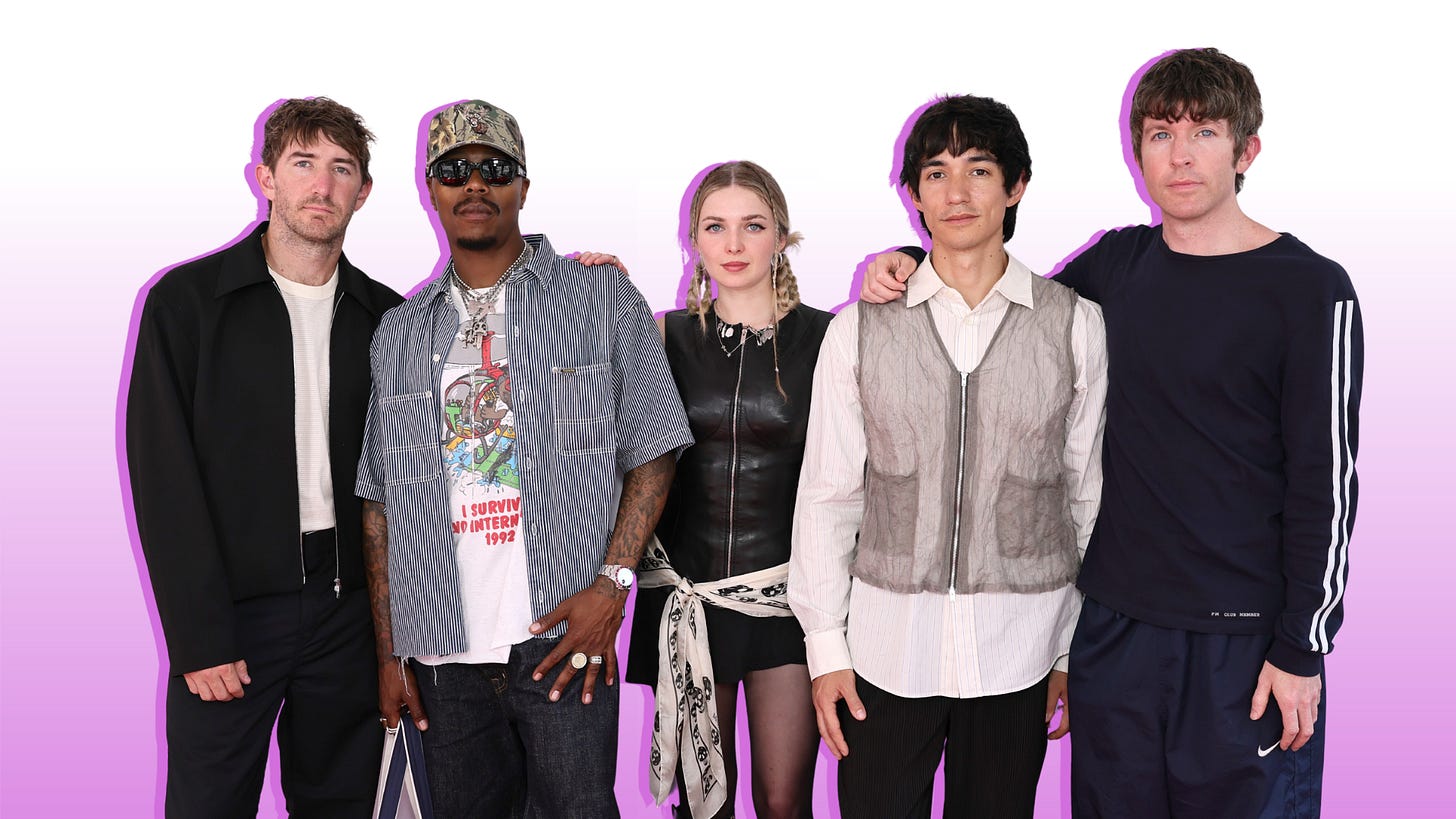Is Your Favorite Band Selling Out or Just Growing? How Turnstile is Expanding Hardcore & Why Community Matters
What Is Selling Out? A History of Sellouts in Music.
Bands throughout history have been labeled as “sellouts,” from Bob Dylan and Metallica to Black Flag and Nirvana1. In the year 2025, we’re still having this conversation – the latest victim of sellout allegations is Turnstile.
Since their inception in the Baltimore hardcore scene more than a decade ago, the band has always pushed the boundaries of what hardcore is – sonically, lyrically, and visually. Triggering some hardcore purists to argue, “is Turnstile a hardcore band?”2
Turnstile’s 2021 studio album, Glow On, shot them to new heights and new audiences, garnering conversation about the band getting “too big.” And in this situation, “too big” kind of means, “more accessible to your not-so-average hardcore” listener, AKA girlies… and after a 4-year break and much anticipation, Turnstile returned with the release of Never Enough this June, and boy did the people have opinions; Internet critics are running wild, saying the album is full of skip tracks and that they’ve sold out. But why does a band expanding their sound = selling out?
In this episode, we’re taking a closer look at what selling out even is. We look into the history of artists who have faced sellout claims and what they had to say in response. When Nirvana faced sellout claims, Kurt Cobain told Rolling Stone, “I don’t blame the average seventeen-year-old punk-rock kid for calling me a sellout. I understand that… And maybe when they grow up a little bit, they’ll realize there’s more things to life than living out your rock & roll identity so righteously.”3
Henry Rollins of Black Flag4 went as far as making a PSA, arguing that bands have the creative freedom to evolve and expand their sound – a practice that gives way to new genres of music – and goes on to say, “selling out is when you make the record you’re told to make instead of the one you want to make.”5
Through our episode discussion, we discover that “selling out” has meant different things to different eras of music – adopting a new audience, going outside the bounds of your genre, giving up your artistic voice for a paycheck, or playing bigger stages with higher ticket prices, are all things that can mark you as a “sellout”. Each generation, each genre, and each fandom has different qualms.
So, where does Turnstile fit into this discussion, and what deems the Baltimore group sellouts? Is it cause they had the time and money to sit down in a studio and challenge the boundaries of their art? Or cause they’ve had the opportunity to play main stages at festivals? Is that selling out? Or maybe it’s because they remain living in their hometown of Baltimore and hire fellow Baltimore creatives…
At their core, Turnstile have always been a band that has challenged the notion of what hardcore is. And, the band has always stood for community, and has remained fiercely loyal to their hometown of Baltimore.
Personally, Turnstile has always existed in my periphery. I was a casual listener of Glow On, but never invested enough to see the band live. As I saw the interviews6 and promo roll out in the months leading up to Never Enough, something piqued my interest. This era felt different. It felt like a turning point for the band, challenging the idea of what hardcore is. In my generation, we haven’t seen a hardcore band expand in this way. From my perspective as someone who grew up on alternative rock and pop punk, hardcore is not something that you happen to fall into, the way Paramore is a gateway band opening doors for pop fans to enjoy alternative music. Hardcore is hardcore. It’s not for everyone. And its community is fiercely loyal. 789
But this era of Turnstile feels like they are opening the doors. Saying hardcore does not have to be just one thing. Hardcore can be expansive, but at its core, hardcore will always be about community. Turnstile is taking a stand and saying this is what we care about, this is what we value. We welcome you if you choose to accept our invitation.
Remember selling out? A new book clocks the last generation of indie bands that went big (LA Times, Jim Rudland, November 2021)
The Rise and Decline of the “Sellout” (Slate, Franz Nicolay, 2017)
Watch Henry Rollins put a Black Flag fan on blast in 1984 (Louder, Alex Burrows, December 2020)
Henry Rollins on the idea of selling out (short YouTube video)
Turnstile Blew Up. Now What? (Pitchfork, Lawrence Burney, May 28, 2025)
Turnstile, Hardcore Punk’s Breakout Band, Can’t Be Contained (NY Times, Matthew Schnipper, May 6, 2025)
Turnstile’s Brendan Yates on what the hardcore band’s new album might be about (LA Times, Mikael Wood, June 6, 2025)
In Conversation: Brendan Yates of Turnstile (Anti Matter, Norman Brannon, January 2024)






Rollins nailed it -- if a band is making the music they want to make, who can argue otherwise? There's an inevitable maturity that takes place for every band/artist as artistic sensibility and life experience are vastly different at 16 and 25 and 34 and beyond.
I always wanted Bloc Party to follow Silent Alarm with Silent Alarm 2 and never got it. Gang of Youths to release something akin to Go Farther in Lightness and ... it hasn't happened.
Audiences likewise will change over time. Taylor Swift has brought in fans in her later records who only attached to her work well after that initial wave of superfans spread her music.
When an audience expands beyond the initial rush of firstcomers, there will inevitably be some kind of backlash. It does appear the punk-centered artists are more susceptible to it than other genres.